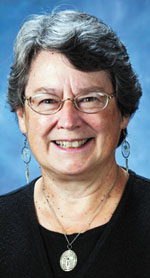By Corrine Winter
Virtually everyone who writes on the topic agrees that one key to the Catholic Intellectual Tradition is the sacramental principle. That is the belief, grounded in the doctrines of creation and incarnation, that material reality can manifest God’s goodness, provide us with insight into God as its source, and can play a vital role in our relationship with God in a particular way in the sacraments of the Church, but in other ways as well. “Dei Verbum,” the Vatican II document on revelation, includes the assertion, which is supported as well by the work of Vatican I, that “God, the first principle and last end of all things, can be known with certainty from the created world, by the natural light of human reason (DV6, citing Rom 1:20).”

This profound respect for the created world is expressed, among other ways, in a high regard for all forms of study that lead to greater understanding of reality and to more truly human ways of living. Witness the fact that the origins of many great universities are Catholic. Thus, far from being inclined to set limits on the pursuit of academic freedom, Catholicism is a strong supporter of free inquiry.
Those who would stereotype Catholicism as anti-intellectual may cite historical incidents such as the Galileo affair or the Inquisition. Honest Catholics must, indeed acknowledge that at times members, even leaders, of the Church have acted in ways not consistent with a high regard for scholarship. Pope (now Saint) John Paul II, in his letter on preparation for the Jubilee Year in 2000, called the Church to examination of conscience and repentance for times when its members exhibited intolerance and even violence in their attempts to safeguard the truth (see Tertio Millennio Adveninete). Further, in 1992, he officially lifted the condemnation of Galileo stating that in making the condemnation Church leaders had overstepped their area of expertise.
And there are notable examples of Catholic support for scholarly work even when some view it as opposed to Christian beliefs. For example, popes since Pius XII have stated that belief in evolution is not opposed to belief in creation. Pope John Paul went further than his predecessor had done, discussing the abundance of evidence that makes evolution a viable theory.
In fact, many scientists have come from within not only the Catholic Church but the Catholic clergy. Google “Catholic scientist” and you will find a list that would take several pages to print. It includes such well known names as Albert the Great, who wrote not only on theology and philosophy but on astronomy, geography, botany and other sciences, and Gregor Mendel, who is sometimes called the father of modern genetics. Colleagues at St. Ambrose University in Davenport recall the work of Msgr. Ulrich Hauber who published a pamphlet shortly after the “Scopes Monkey Trial.” In the pamphlet, Msgr. Hauber stated that Catholics should be especially prepared to integrate new scientific findings without letting go of the great teachings of the faith. Msgr. Hauber is still remembered through an annual lecture at St. Ambrose.
So does that mean that Catholicism supports total license in academic research? No. We hold several guiding principles. Three of these could be called integrity, humility and commitment to the common good. All studies require honest effort to discover truth and not simply to support already favored conclusions or to increase the scholar’s prestige. Moreover, every scholar should be sufficiently humble to acknowledge and to be challenged by the contributions of others. And all human effort should be directed toward the common good. Thus, work aimed at destruction rather than at support of life or work that serves to belittle any person or group would not be supported.
Are there still areas in which scholars and people of faith experience painful conflicts? That is also the case. One need only be aware of current events to quickly list some of those areas. Those conflicts as well as the many challenges that face our world today demonstrate our ongoing need to grow in understanding of the realities of our world. The world which we understand as showing forth God’s love and goodness.
(Corinne Winter is a professor of theology at St. Ambrose University in Davenport.)








